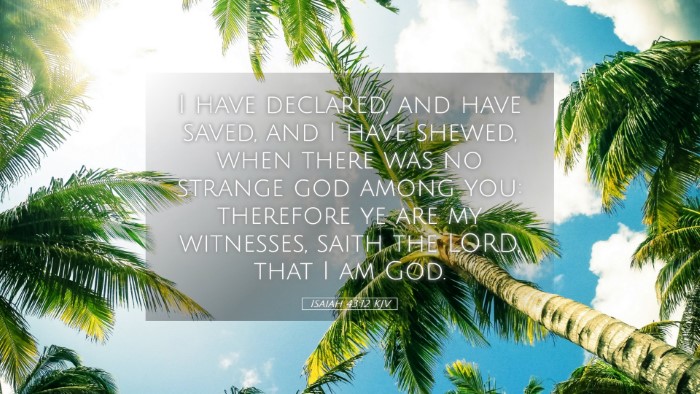Isaiah 43:12 - Commentary
Verse Reference: Isaiah 43:12
"I have declared, and have saved, and I have shewed, when there was no strange god among you: therefore ye are my witnesses, saith the LORD, that I am God."
Introduction
The verse Isaiah 43:12 stands as a profound testimony to God's sovereignty and His ongoing relationship with His people. As we delve deeper into this passage, it becomes essential to explore the rich insights provided by public domain commentaries from notable theologians such as Matthew Henry, Albert Barnes, and Adam Clarke. Their analyses illuminate the theological significance and historical context of this scripture, offering a well-rounded understanding for pastors, students, theologians, and scholars.
Theological Context
God's Declaration of His Actions
In the passage, the phrase "I have declared, and have saved, and I have shewed" indicates God's proactive engagement in the history of Israel. Matthew Henry emphasizes that this declaration reflects God's self-revelation and the salvific works that demonstrate His fidelity to His covenant. The verb forms used imply a continuity of action, suggesting that God has consistently intervened in Israel's history:
- Declaring His purposes through prophets.
- Saving His people during times of distress.
- Showing His glory and might through wonders.
Albert Barnes further expounds on the nuances of God's declarations. He asserts that God has not only declared His will but has also deeply involved Himself in the protection and deliverance of His people, thereby fulfilling His promise. This involvement reinforces the notion that God is both a speaker and a doer in the prophetic narrative.
The Concept of Witnesses
Purpose of the Witnesses
The latter part of the verse, "therefore ye are my witnesses," carries significant weight in understanding the role of Israel. Adam Clarke notes that the calling of Israel as witnesses implies a divine commission to testify about God's nature and His acts. This witness is twofold:
- Personal Experience: Israel's collective memory of God's interventions serves as a testament to His greatness.
- Corporate Responsibility: As witnesses, Israel is expected to share their knowledge of God with the nations, reflecting a universal calling.
This idea resonates with the New Testament call for believers to be witnesses of Christ, suggesting an ongoing theme of testimony throughout biblical history. The rich heritage of being a witness establishes a continuity of faith that connects the Old Testament covenant community with the New Testament church.
Theological Implications
The Nature of God
The assertion "that I am God" at the end of the verse emphasizes monotheism and the uniqueness of God in contrast to the "strange gods" that may exist around them. Matthew Henry points out that this Underlines God's exclusivity in the relationship with Israel, meaning that they are called to acknowledge Him alone amidst pagan influences. This verse serves as a reminder of the necessity of maintaining distinctiveness in the worship of one true God even amid cultural pressures.
Historical Context
Isaiah's ministry occurred during a time of great turmoil and impending exile for Israel. Understanding this historical context enhances our comprehension of the urgency and gravitas of God's words through Isaiah. Albert Barnes provides insight into the condition of Israel at the time:
- Israel faced threats from surrounding nations.
- Spiritual decline and idolatry plagued the people.
- Yet, God remained faithful to His covenant promises.
This background illustrates the need for Israel to recall their identity and purpose as God's chosen people, entrusted with the mission of representing Him to the world.
Practical Applications
Modern Day Witnesses
The exhortation for Israel to be witnesses resonates deeply within contemporary Christian contexts. In a world filled with distractions and competing spiritual ideologies, believers today must consider how they fulfill the call to witness:
- Personal Testimony: Each Christian is challenged to reflect on their personal experiences with God, declaring His faithfulness and provision in their lives.
- Community Engagement: The church collectively carries the duty to bear witness to the surrounding communities, demonstrating God's love through service and outreach.
- Standing Firm in Truth: In an age of relativism, believers must uphold the truth of God's Word in a manner that is both compassionate and bold.
Conclusion
Isaiah 43:12 encapsulates profound truths about God's nature, His mighty acts in history, and the calling of His people to be witnesses. As we glean insights from esteemed commentators, we recognize the significance of understanding our role in the ongoing narrative of redemption. The theological richness of this verse serves not only as a historical reflection but as a clarion call for current believers to embody the same witness that Israel was tasked with so long ago.
In summary, the verse reminds us of God's unwavering presence and the responsibility placed upon us as His witnesses in a world desperate for His truth.


